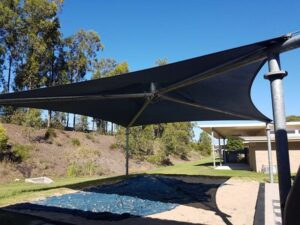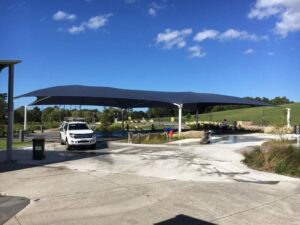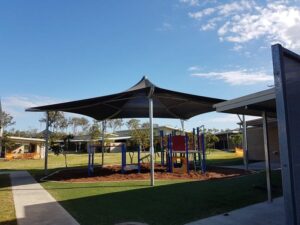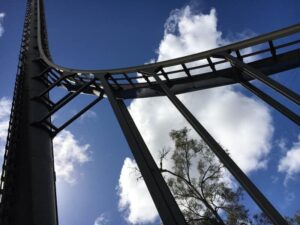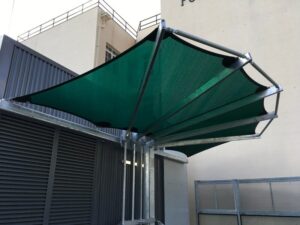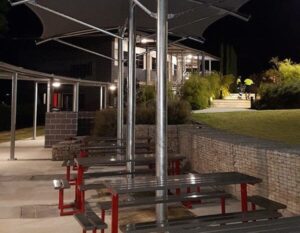Commercial Shade Structures
YOU ARE HERE:
With so many commercial shade structure solutions available, Versatile Structures covers a wide range of designs to choose from, all built to stand the test of time. We work closely with our clients from the initial design concept, considering the functionality, site-specific requirements, shading efficiencies, wind regions, engineering, and adequate footings to ensure a structurally sound build, through to the aesthetic requirements ensuring a visually bold and appealing result.
All our commercial shade structures are custom-made and can be tailored to suit any architectural design intent. We guarantee our promised delivery dates and will do everything in our ability to ensure your project is delivered on time and on budget, every time.
Education and childcare
We create quality, functional, and eye-catching shade sail solutions for all outdoor areas including pathways, carparks, entry ways, playgrounds, and sitting areas. Our custom sun and wet weather designs meet the needs of each individual daycare and education centre to ensure the protection, well-being, and future health of young children’s vulnerable skin. We use only the highest quality substrates that offer up to 99% UV-R protection.

Award-winning retractable PVC roofing system for Guardian Early Learning Centre in Brisbane.
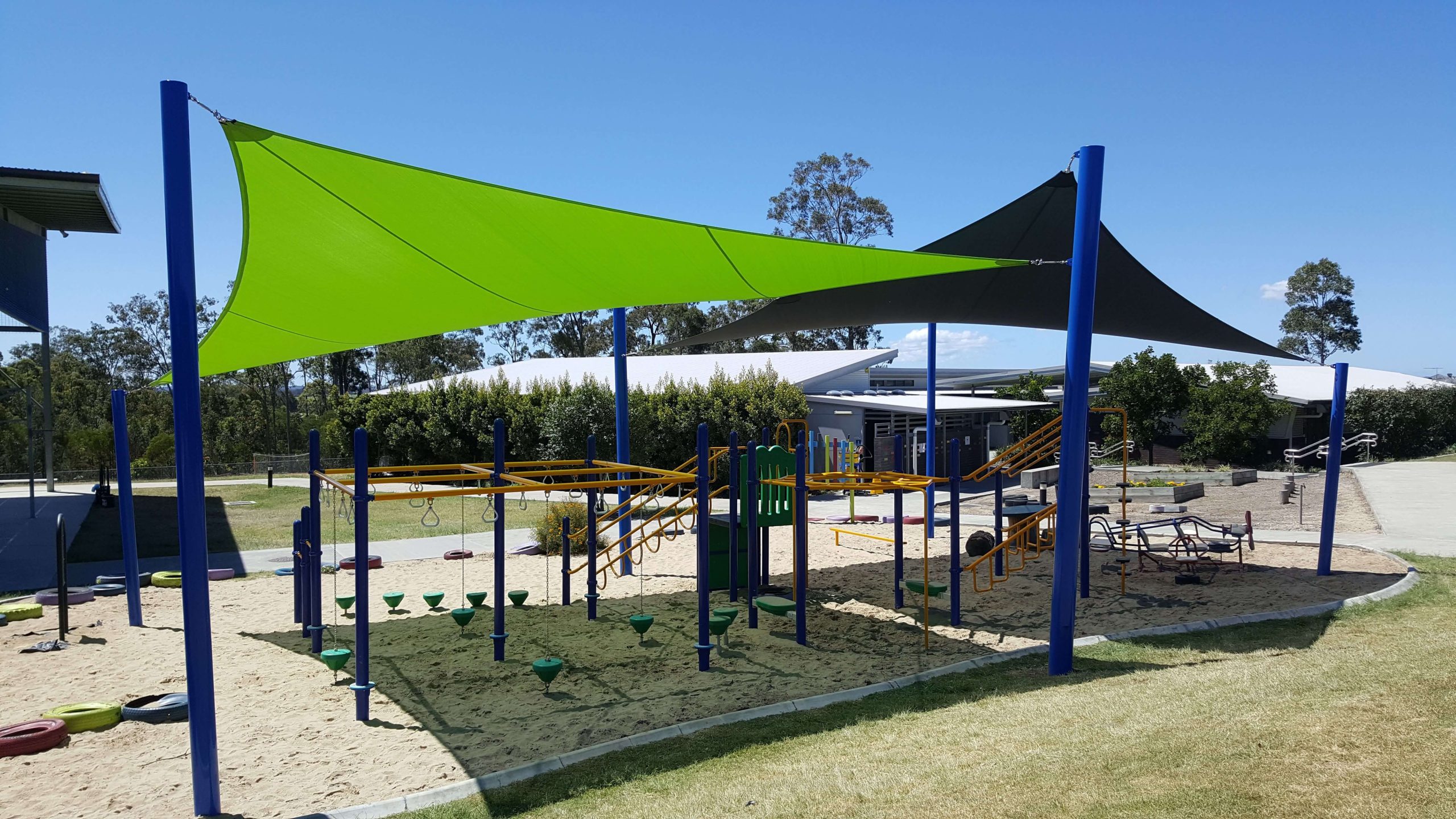
Little Darlings Early Development Centre – Upper Mount Gravatt
 Canterbury College 450m2 grandstand shade membrane for their new Olympic-size pool.
Canterbury College 450m2 grandstand shade membrane for their new Olympic-size pool.
Parks and recreation
We work with Councils in principal contractor and sub-contractor roles on projects including new playgrounds, parks, and recreational areas, as well as the redevelopment of existing infrastructure. As Dreamworld’s preferred contractor, we have completed more than 20 shade structure projects for them to date, do large-scale projects for Australia Zoo, and collaborate with landscape architects and landscapers, to create welcoming shade spaces to protect visitors from Australia’s harsh weather conditions. Our award-winning project for Noosa Botanical Gardens had to ensure the safety of protected plant species, while in our custom creation of the right shade structures our team helped carry crocodiles and created solutions for sites with very limited access.
 Our award-winning intricate roof shade design represents a Sumatran house for Dreamworld Tiger Island.
Our award-winning intricate roof shade design represents a Sumatran house for Dreamworld Tiger Island.
 An end-to-end shade solution for Brisbane City Council at West End Urban.
An end-to-end shade solution for Brisbane City Council at West End Urban.
 A unique curved steel frame sporting a collage of aluminium butterflies and dragonflies for Pine Rivers Park
A unique curved steel frame sporting a collage of aluminium butterflies and dragonflies for Pine Rivers Park
Commercial and retail
Each retail store or shopping mall has unique needs from visual impacts to protection of customers and vehicles. We have worked with large and small retailers to provide solutions that meet Council and architects’ approval as well as ensuring minimal disruption to shoppers by building most of the structure off-site and then just needing a small window to install.
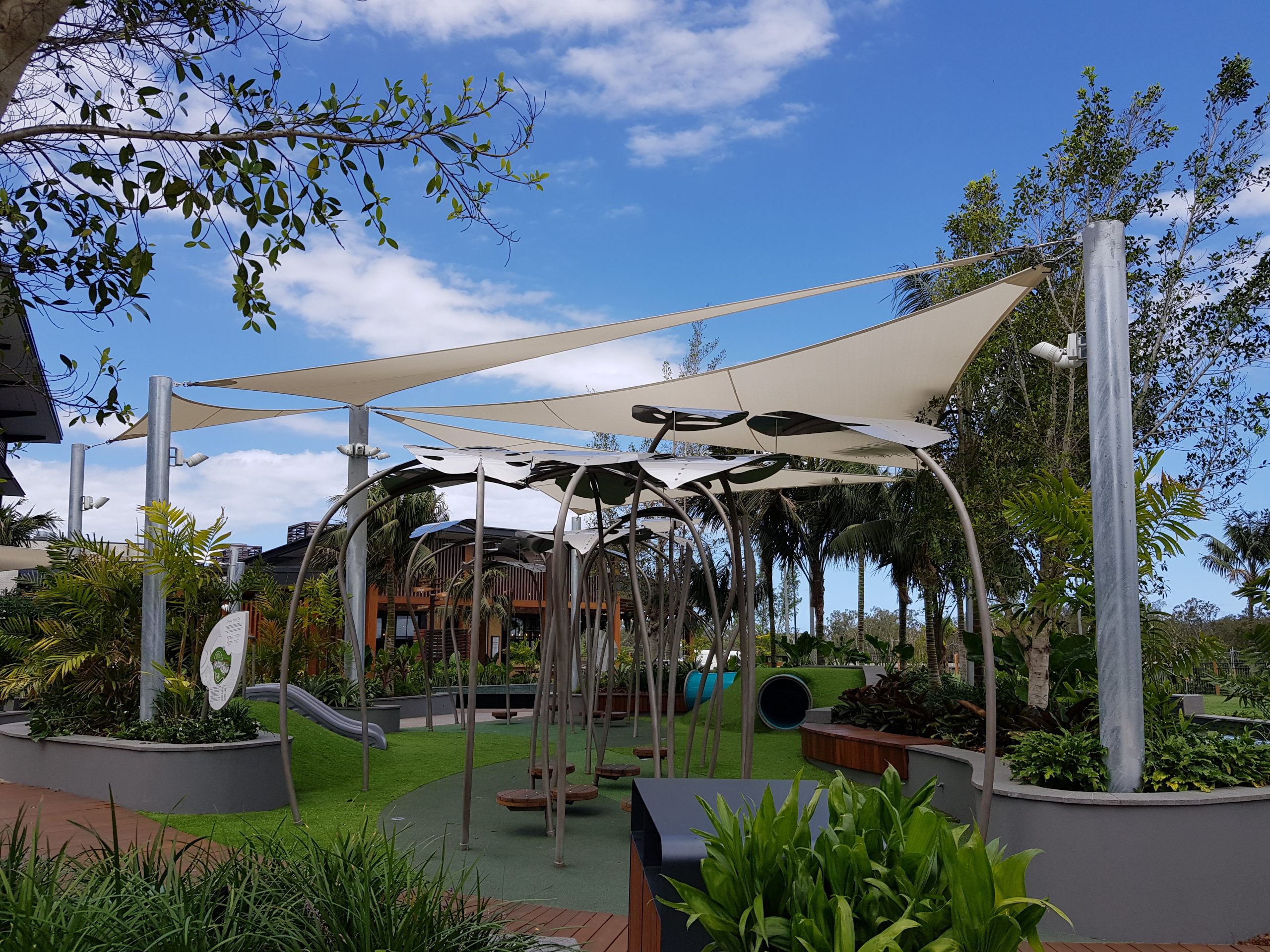
We designed, manufactured, and installed custom architectural structures as part of the 35543.39₹ million redevelopment of Pacific Fair, Gold Coast’s unmissable shopping designation.
For the 18-storey Lucent Apartments in Newstead we designed, engineered, manufactured, and installed custom aluminium screens, sun hoods, tracking systems, and vertical fins.
Car parks
With various car park shade structure options available, from single car lanes to large full coverage areas for long-term parking, we use a variety of shade fabrics and materials depending on your needs to provide sun, full waterproof, and even hail protection. We can also look at a modular design and build the shade structure over a period to meet your budget.
 An end-to-end solution including the design, certification, geotechnical investigations, site survey, and building approvals for a 1,485m2 custom car park shade structure at Pelican Waters Shopping Village
An end-to-end solution including the design, certification, geotechnical investigations, site survey, and building approvals for a 1,485m2 custom car park shade structure at Pelican Waters Shopping Village
 An install-and-forget shade solution for Brisbane Camperland.
An install-and-forget shade solution for Brisbane Camperland.
Time frame for a commercial shade structure
As with all commercial structure projects, there are factors like weather and council approval that can impact timeframes. All things considered, the average commercial shade structure project takes around 12 weeks to complete. For a full breakdown of how the 12 weeks are made up read our article “How much time to allow for a custom shade project”.
Key benefits of our commercial shade structures
- Complete Design and Construct Service
- Engineered to specific site conditions.
- Custom fabricated to exact design specifications
- Steel coatings to suit site-specific conditions.
- Highest quality materials and products used.
- Typical lifespan 10-15+ years
Recommended applications
- Commercial Construction Projects
- Council Park Shade Structures
- School Shade Structures
- Commercial Landscaping Projects
Materials used
Commercial Shade structure articles
- Create a large shade area with a commercial shade cloth
- Custom commercial umbrellas for restaurants
- Commercial shade structures: How they can benefit your business
- Commercial shade structures in Brisbane and the Sunshine Coast
- The value of commercial shade structures and retractable roof systems
- How to buy the appropriate Commercial Shade Sail
- What’s the difference between a commercial and industrial shade structure
- The Different Types of Commercial Shade Structures
- Before you buy: things to know about commercial shade structures
- Transform Your Commercial Space Without A Build
- Different types of commercial shade systems explained
- In Sunshine Coast? Commercial Shade Structures Can Protect Against the Harsh Sun
- Strength Starts Below Ground
Frequently Ask Questions
Commercial shade structures come in various types such as shade sails, canopies, umbrellas, pergolas, and shade structures made of metal or fabric.
Consider factors like the intended use of the space, location, size, budget, and aesthetic preferences. Consulting with a shade structure specialist can help you make an informed decision.
Yes, many shade structure providers offer customization options to tailor the design, size, colour, and materials to fit your specific needs and preferences.
Materials commonly used include high-density polyethylene (HDPE) or Mono-mono monofilament fabric, steel, aluminium, and stainless steel. The choice of material depends on factors such as durability, application, environment, aesthetics, and budget.
Yes, most commercial shade structures are designed to withstand various weather conditions, including sun exposure, wind, rain, and hail. However, the level of durability may vary depending on the materials used and the quality of construction.
Yes, like anything, commercial shade structures may require periodic maintenance to ensure longevity. Maintenance tasks may include cleaning, inspection for damage, and occasional repairs.
In most cases, yes. However, factors such as local building codes, zoning regulations, and site conditions may affect the installation process. It’s important to consult with a professional installer to ensure compliance and proper installation.
Yes, commercial shade structures can help reduce energy costs by providing shade and reducing the need for air conditioning or fans, thus decreasing cooling loads and energy consumption.
Yes, many shade structure fabrics are designed to block a significant amount of harmful UV rays, offering protection to people and outdoor furnishings or assets beneath the structure.
The lifespan of a commercial shade structure can vary depending on factors such as the quality of materials, installation, and maintenance. However, with proper care, many shade structures can last for 15 to 30 years or more before the roofing material required replacement.
The best material for a shade structure depends on various factors, including the intended use, location, climate, and budget. Different materials have different properties, advantages, and limitations. Here are some common materials used for shade structures and their characteristics:
Shade Cloth or Shade Mesh:
Advantages: Shade cloth is a popular choice for shade structures due to its breathability, durability, and UV protection. It allows air circulation while blocking UV rays, making it suitable for areas with hot and sunny weather.
Limitations: Shade cloth is not waterproof and won’t provide protection from rain. It also has a finite lifespan and can wear out over time.
PVC-Coated Polyester or Vinyl Fabric:
Advantages: These materials are waterproof and provide excellent protection from rain. They are also UV-resistant and come in various colours and patterns. PVC-coated fabrics are often used for tension structures and canopies.
Limitations: They are less breathable than shade cloth and may trap heat in some cases. They may require proper ventilation to prevent condensation.
Metal (Steel or Aluminum):
Advantages: Metal structures are durable and provide robust support for shade materials. They are suitable for larger or more permanent installations and can withstand harsh weather conditions.
Limitations: Metals can get hot in the sun and may require additional measures to reduce heat radiation. They are also heavier and may have higher installation costs.
Wood:
Advantages: Wood can provide a natural and aesthetically pleasing look. It’s often used for pergolas and arbours, creating a shaded outdoor space with a rustic or classic appearance.
Limitations: Wood requires regular maintenance to prevent rot and decay. It may not be as durable as metal in the long term.
Canvas or Fabric Membranes:
Advantages: Canvas and fabric membranes offer a lightweight and versatile option for shade structures. They can be customised in terms of shape, size, and colour.
Limitations: While some fabric membranes are waterproof, others may not provide full rain protection. The choice of fabric can impact durability and UV resistance.
Polycarbonate Panels:
Advantages: Polycarbonate panels are translucent and offer both shade and some natural light. They are durable, weather-resistant, and provide protection from UV rays.
Limitations: They may not provide complete shade and can become hot in direct sunlight.
Bamboo or Natural Materials:
Advantages: Bamboo and other natural materials can create a unique and aesthetically pleasing shade structure. They are often used in tropical or eco-friendly designs.
Limitations: Natural materials require regular maintenance to prevent deterioration and may not be as long-lasting as synthetic options.
Ultimately, the best material for your shade structure depends on your specific needs and preferences. Consider factors such as the climate in your area, the level of sun and rain protection required, the intended use of the structure, and your budget when choosing the most suitable material for your shade project.
